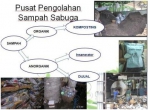Bandung's Waste Solutions: ITB Students Innovate “Biomate” for Trash Reduction

BANDUNG, itb.ac.id—The massive fire that occurred at the Sarimukti Final Disposal Site, located in Cipatat District, West Bandung Regency, some time ago became the concern of the residents of Bandung and its surroundings. This was not without reason, as the fire spread quickly and burned 10 hectares of land.
This is thought to have occurred because of a reaction between organic and inorganic residues. Organic waste that undergoes anaerobic decomposition will cause a foul odor and release methane gas into the atmosphere. This gas is one of the contributors to greenhouse gasses, which have an impact on global warming.
This problem ultimately encouraged eight ITB students to come up with an innovation called “Biomate.”
Biomate succeeded in winning the 2023 Pertamina CoRE ITB (Co-creation Research of Entrepreneurship), an event held by the Innovation and Entrepreneurship Development Institute (LPIK) ITB in collaboration with Pertamina. The members of the Biomate Team include Naufal Fahmi Zakiuddin, Bene Genhaq Suseno, Suma Danu Ristianto, Annisa Wulandari, Angel Erwinda Putri Tambun, Muhamad Hilmi Fadhlurohman, Syita Fauziah, and Pelita Maulida.
"Starting from these problems, we saw the opportunity for methane gas to be used as energy, especially for cooking. We are targeting food and beverage (F&B) businessmen. The FnB business is the second largest contributor of organic waste after households. Therefore, we initiated Biomate to reduce organic waste produced by the F&B business and to save on their gas expenses," said Naufal.
Biomate is also based on the behavior of FnB businessmen who are starting to be aware of organic waste processing; however, the process requires additional costs and does not provide direct benefits for their business. Therefore, Biomate is created to be a profitable solution for them.

Initially, organic waste from restaurants was collected and then put into Biomate. This waste processing tool works by decomposing the organic waste to produce methane gas. This methane gas is flammable and can thus be used as fuel for cooking. Liquid and solid residues from the fermentation process can be used as plant fertilizer.
“The resulting gas will be channeled and collected into a gas storage container. Once the concentration exceeds 50%, the methane gas can be used as fuel. We integrated Biomate with IoT (Internet of Things) so that every stage can be monitored properly," said Bene.
According to Bene, IoT can be one of the added values of Biomate, especially as a technology for monitoring, maintaining, and analyzing the biogas process continuously. Other advantages include the Biomate's compact design and size, easy operation, and cheaper rental costs compared to conventional biogas devices.
One of the other members, Annisa, hopes that in the future Biomate can also solve waste-related issues in the city of Bandung and its vicinity. "F&B businesses can process their organic waste independently and produce alternative fuels that are environmentally friendly and pocket-friendly," said Annisa.
Reporter: Maharani Rachmawati Purnomo (Oseanografi ‘20)
Translator: Ayesha Lativa Mafaza (Postharvest Technology ‘21)
Editor: Ariq Ramadhan Teruna (Chemical Engineering ‘21)

scan for download





